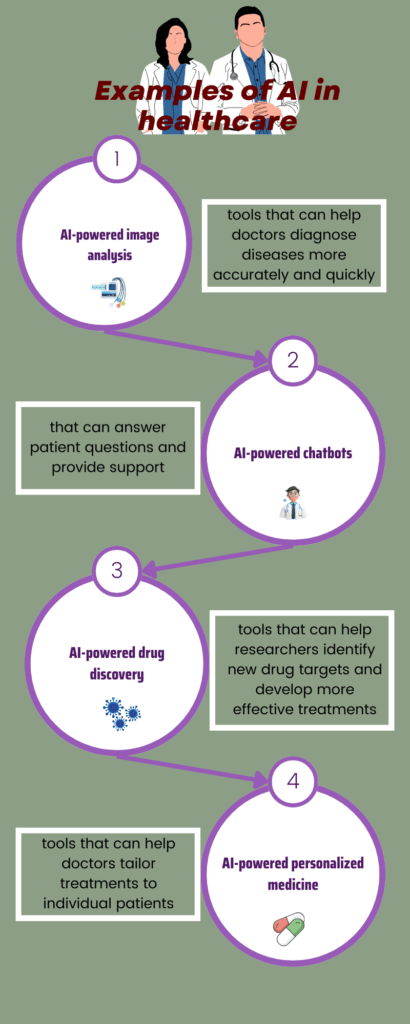
Artificial intelligence (AI) is rapidly transforming many industries, including healthcare. AI is a broad term that encompasses a variety of technologies that enable machines to learn and perform tasks that would normally require human intelligence.
In healthcare, AI is being used to develop new drugs and treatments, diagnose diseases, and provide personalized care to patients. AI-powered tools can help doctors and other healthcare professionals make better decisions, improve patient outcomes, and reduce costs.
This blog post is a beginner’s guide to AI in healthcare. We will discuss what AI is, how it is being used in healthcare, and the benefits it offers. We will also provide examples of AI in healthcare and discuss some of the challenges and ethical considerations associated with this technology.
What is AI in healthcare?
AI in healthcare refers to the use of artificial intelligence to improve the quality and efficiency of healthcare delivery. AI can be used to automate tasks, identify patterns in data, and make predictions.
Some examples of how AI can be used for healthcare include:

How is AI used in healthcare?
AI is being used in healthcare in a variety of ways. Here are a few examples:
- Diagnosis: AI-powered image analysis tools are being used to help doctors diagnose diseases more accurately and quickly. For example, AI can be used to identify cancer cells in medical images or to detect signs of heart disease in EKGs.
- Treatment: AI is being used to develop new drugs and treatments. For example, AI can be used to identify new drug targets or to develop personalized treatment plans for individual patients.
- Patient care: AI is being used to improve patient care in a variety of ways. For example, AI-powered chatbots can answer patient questions and provide support. AI can also be used to monitor patients’ health remotely and to identify potential complications early on.
The Benefits of AI in Healthcare
AI offers several benefits for healthcare, including:
- Improved accuracy and efficiency: AI can help doctors and other healthcare professionals make better decisions and improve patient outcomes. For example, AI-powered image analysis tools can help doctors diagnose diseases more accurately and quickly.
- Reduced costs: AI can help to reduce the cost of healthcare by automating tasks and improving efficiency. For example, AI-powered chatbots can answer patient questions and provide support, which can free up doctors and nurses to focus on more complex tasks.
- Personalized care: AI can help to provide more personalized care to patients. For example, AI can be used to develop personalized treatment plans based on individual patients’ medical history and genetic makeup.
Implementation of AI healthcare today

Challenges and ethical considerations
While AI offers several benefits for healthcare, there are also some challenges and ethical considerations associated with this technology.
One challenge is that AI systems are only as good as the data they are trained on. If AI systems are trained on biased data, they will produce biased results. This is a particular concern in healthcare, where bias can lead to disparities in care.
Another challenge is that AI systems can be complex and difficult to understand. This can make it difficult for doctors and other healthcare professionals to trust AI systems and use them effectively.
There are several ways AI is being used in health care today, and new developments coming. There is a lot of potential for its use, but it needs to be applied in the right way, and it’s important that the care of the patient is at the core of these ideas, and human connection is essential.
I will be looking into these developments in more detail in future posts. Join the Facebook page to keep up to date.
or subscribe to the newsletter – Only Human.
recent news of AI in healthcare
What benefits does AI offer in healthcare?
AI enhances accuracy, reduces costs, and provides personalized care. It aids healthcare professionals in making better decisions, automating tasks, and tailoring treatments based on individual patient data.
What challenges are associated with AI in healthcare?
Challenges include biases in training data, potentially leading to disparities in care, and the complexity of AI systems, making it challenging for healthcare professionals to trust and utilize these technologies effectively.
How does AI prioritize patient well-being in healthcare practices?
It is crucial to maintain a patient-centered approach in AI applications, ensuring that human connection is preserved, and AI technologies are implemented in ways that prioritize patient care above all else.
What is the importance of trust in AI healthcare applications?
Trust is vital in AI healthcare applications, as healthcare professionals need to trust AI systems to utilize them effectively. Transparency, unbiased data, and clear communication can help establish trust in these technologies.
